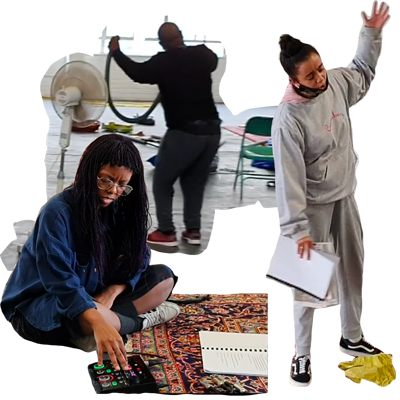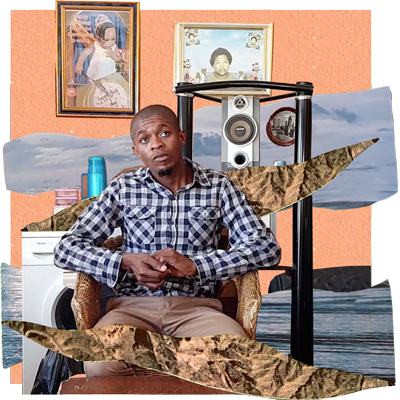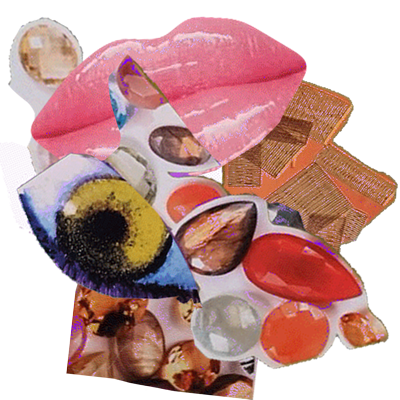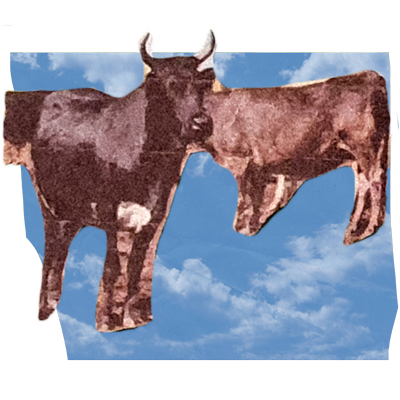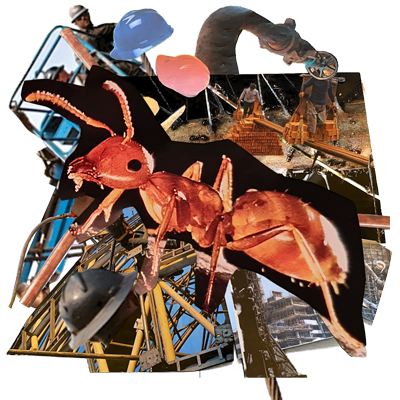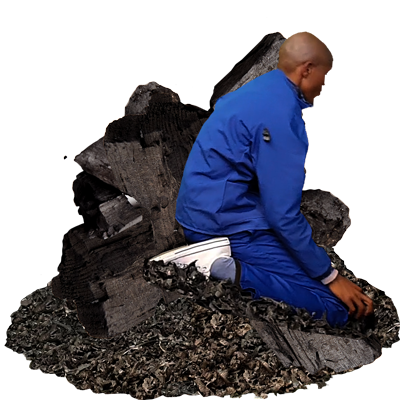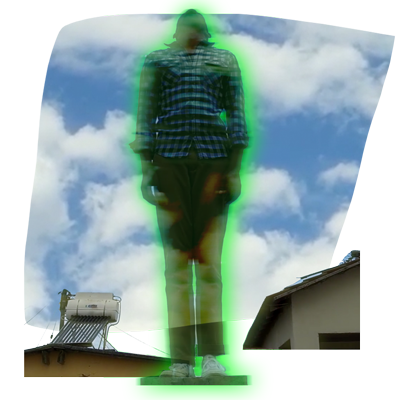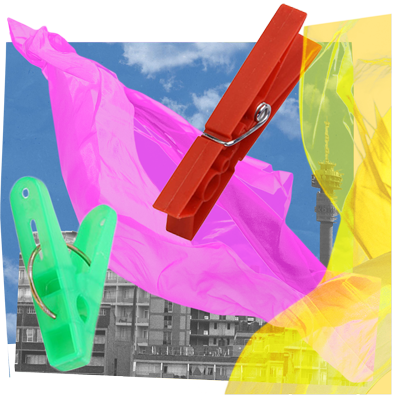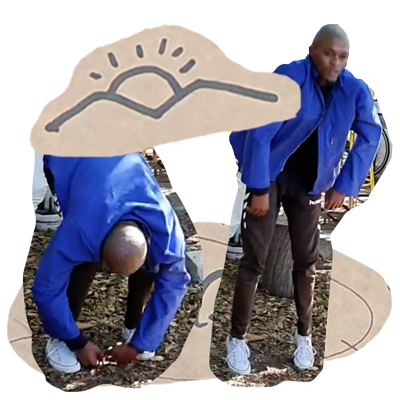AnotherKind
About
Presented by the National Arts Festival, Winner of the 2020 Distell National Playwright Competition.
AnotherKind is a funeral for a piece of theatre which never existed and a celebration of the birth of a new hybrid artwork between the digital and the live. It draws from Amy Louise Wilson’s Distell National Playwright award-winning script ‘Another Kind of Dying’ which tells the story of Silumko - a young man from rural Eastern Cape who moves to Johannesburg after the death of his father. Due to the pandemic, ‘Another Kind of Dying’ was not able to be staged as a play.
This new work both builds on and breaks apart the original script across a series of short video, performance and sound pieces which were created over a 6 week creative lab in Cape Town, South Africa. This website is an intimate view into another kind of process – a meeting of text fragments, recorded rehearsals and performance and sound experiments which challenge the formal limits of live collaboration and theatrical experience.
With thanks to:
Puleng Stewart & Jannous Aukema (The Workshop, Cape Town), Rucera Seethal and the National Arts Festival Team, Mike van Graan
Presented by the National Arts Festival, Winner of the 2020 Distell National Playwright Competition.
AnotherKind is a funeral for a piece of theatre which never existed and a celebration of the birth of a new hybrid artwork between the digital and the live. It draws from Amy Louise Wilson’s Distell National Playwright award-winning script ‘Another Kind of Dying’ which tells the story of Silumko - a young man from rural Eastern Cape who moves to Johannesburg after the death of his father. Due to the pandemic, ‘Another Kind of Dying’ was not able to be staged as a play.
This new work both builds on and breaks apart the original script across a series of short video, performance and sound pieces which were created over a 6 week creative lab in Cape Town, South Africa. This website is an intimate view into another kind of process – a meeting of text fragments, recorded rehearsals and performance and sound experiments which challenge the formal limits of live collaboration and theatrical experience.
With thanks to:
Puleng Stewart & Jannous Aukema (The Workshop, Cape Town), Rucera Seethal and the National Arts Festival Team, Mike van Graan
Created by
Amy Louise Wilson Script & Creative Producer
Aphiwe Livi Performer & TranslatorFrancois Knoetze Art Director, Scenography & Video Art
Joanna Evans Performance Director & Co-creative Director
Gugulethu Duma Sound Artist
Duduetsang Lamola (blk banaana) Collage Artist Iman Isaacs Performer & Vocals
Nhlanhla Mkhwanazi Performer & Vocals Babalwa Makwetu Performer & Vocals Buhle Ngaba Performer & Vocals Kathleen Stephens Performer Thembekile Komani Performer
Phamela Manzi Performer
Gomez Bakwene Intern
Nicole Goto Intern
Yusrah Bardien Project Manager
Francis Burger Website design, editing, making
Zara Julius & KONJO Playlist Curation
Amy Louise Wilson Script & Creative Producer
Aphiwe Livi Performer & TranslatorFrancois Knoetze Art Director, Scenography & Video Art
Joanna Evans Performance Director & Co-creative Director
Gugulethu Duma Sound Artist
Duduetsang Lamola (blk banaana) Collage Artist Iman Isaacs Performer & Vocals
Nhlanhla Mkhwanazi Performer & Vocals Babalwa Makwetu Performer & Vocals Buhle Ngaba Performer & Vocals Kathleen Stephens Performer Thembekile Komani Performer
Phamela Manzi Performer
Gomez Bakwene Intern
Nicole Goto Intern
Yusrah Bardien Project Manager
Francis Burger Website design, editing, making
Zara Julius & KONJO Playlist Curation
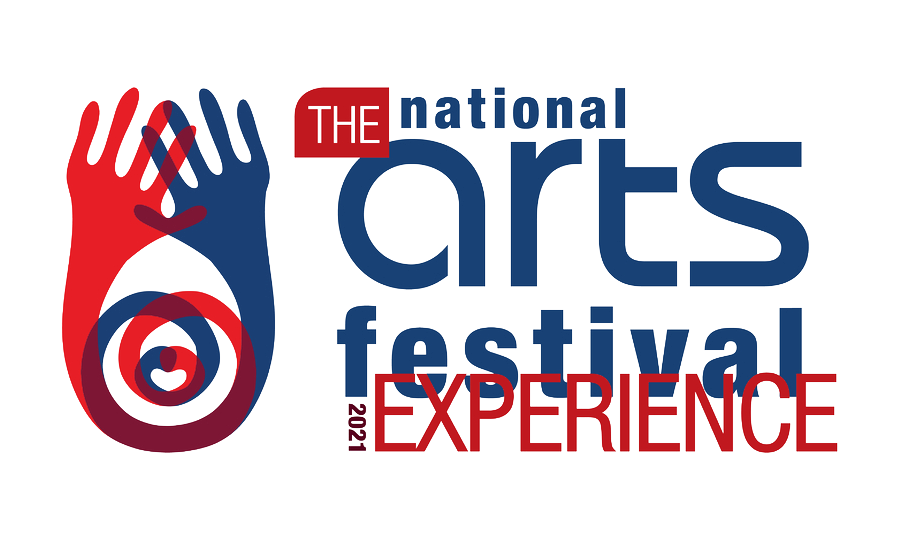


AnotherKind, Playlist by Zara Julius*
1.
Caiphus Semenya, Ziph'inkomo, 1996. The Very Best Of.
Caiphus Semenya, Ziph'inkomo, 1996. The Very Best Of.
2.
Kwesta ft. Wale, Spirit, 2018. Spirit.
Kwesta ft. Wale, Spirit, 2018. Spirit.
3.
Buhlebendalo, Mdali, 2020. Chosi.
Buhlebendalo, Mdali, 2020. Chosi.
4.
Bongeziwe Mabandla, Ngawe Mama, 2012. Umlilo.
Bongeziwe Mabandla, Ngawe Mama, 2012. Umlilo.
5.
Bongeziwe Mabandla, Ndokulandela, 2017. Mangaliso.
Bongeziwe Mabandla, Ndokulandela, 2017. Mangaliso.
6.
Letta Mbulu, There’s Music in the Air, 1976. There’s Music in the Air.
Letta Mbulu, There’s Music in the Air, 1976. There’s Music in the Air.
7.
Howard Roberts Chorale, Motherless Child, 1968. Let My People Go
Howard Roberts Chorale, Motherless Child, 1968. Let My People Go
8.
The African Inkspots, I’m Jealous of You, 1948.
The African Inkspots, I’m Jealous of You, 1948.
9.
Spoek Mathambo (ft Spizzy & Raiko), Jimmy Comes to Jozi, 2020. Tales From The Lost Cities
Spoek Mathambo (ft Spizzy & Raiko), Jimmy Comes to Jozi, 2020. Tales From The Lost Cities
10.
Afrika Mamas, Thula Sana, 2018. Iphupho
Afrika Mamas, Thula Sana, 2018. Iphupho
11.
Ami Faku, Ubuhle Bakho, 2019. Imali.
Ami Faku, Ubuhle Bakho, 2019. Imali.
12.
Vigro Deep ft Nokwazi, DJ Maphorisa, Vula Vala, 2019. Baby Boy II Reloaded.
Vigro Deep ft Nokwazi, DJ Maphorisa, Vula Vala, 2019. Baby Boy II Reloaded.
13.
M’du, Siya jola (Ok’Salayo). 1998. M’du or Die.
M’du, Siya jola (Ok’Salayo). 1998. M’du or Die.
14.
Moonchild Sanelly, Thunda Thighs, 2020. Nüdes.
Moonchild Sanelly, Thunda Thighs, 2020. Nüdes.
15.
Moonchild Sanelly, F-Boyz, 2020. Nüdes.
Moonchild Sanelly, F-Boyz, 2020. Nüdes.
16.
Apostle Hlangu, Jehova Sikelela, 2015. Hamba Nami Jesu.
Apostle Hlangu, Jehova Sikelela, 2015. Hamba Nami Jesu.
17.
Ringo Madlingozi, Udom, 1996. Vukani.
Ringo Madlingozi, Udom, 1996. Vukani.
Reading List by Amy Louise Wilson
W.C . Scully, Daniel Vananda: The Life Story of a Human Being. (Cape Town: Juta, 1923)
“At length they reached the Rand ... without whose output of lubricating gold the axles of those wheels which drive the mill of the world's commerce might long since have burnt at their bearings and fallen into ruin' (pp. 187-8). These wheels are literal, those of a mineshaft headgear. Daniel 'stepped into an iron box, which clonked down and down into the murky depths.” (pp. 189-90)
William Plomer, Ula Masondo, in Selected Stories (Cape Town: Philip, 1984)
“The passengers crowded to the window to see these peaks ... a dump as big as a hill, quite near, rising sheer and white from the ground, with tiny trucks running along the top ... on the other side of it the steel and iron and stone of the mine buildings stood drab and stern, bitter citadels of unreasoning industry.... Dirty children were playing in a donga; they could be heard stirring with a stick among old tins in an ashpit. Some women were drinking tea on a veranda.... A native was playing a concertina— Rows of gaudy posters on a hoarding ran past as if on wheels.... 'Here' s an omen,' said Ula Masondo, who knew what he felt but not what he meant.” (pp. 55-6)
R.R.R . Dhlomo, An African Tragedy (Lovedale: Lovedale Press, 1931)
Frank Brownlee, Cattle Thief: The Story of Ntsukumbini (London: Cape, 1929)
“The journey to the mines was long and confusing, but we managed to reach there safely. I said the first thing we must do was to buy spades and dig for ourselves; why should we work for any master and give him the gold.”(p. 120).
Peter Abrahams, Mine Boy, (Johanesburg: Heinemann, 1946)
“Listen to me Xuma . I will try to make you understand. In the city it is like this: all the time you are fighting. Fighting. Fighting! When you are asleep and when you are awake. And you look only after yourself If you do not you are finished. If you are soft everyone will spit on your face. They will rob you and cheat you and betray you. So, to live here, you must be hard. Hard as a stone. And money is your best friend. With money you can buy a policeman. With money you can buy somebody to go to jail for you.... It may be good, it may be bad, but there it is. And to live one must see it. Where you come from it isn't so. But here it is so.”
“At length they reached the Rand ... without whose output of lubricating gold the axles of those wheels which drive the mill of the world's commerce might long since have burnt at their bearings and fallen into ruin' (pp. 187-8). These wheels are literal, those of a mineshaft headgear. Daniel 'stepped into an iron box, which clonked down and down into the murky depths.” (pp. 189-90)
William Plomer, Ula Masondo, in Selected Stories (Cape Town: Philip, 1984)
“The passengers crowded to the window to see these peaks ... a dump as big as a hill, quite near, rising sheer and white from the ground, with tiny trucks running along the top ... on the other side of it the steel and iron and stone of the mine buildings stood drab and stern, bitter citadels of unreasoning industry.... Dirty children were playing in a donga; they could be heard stirring with a stick among old tins in an ashpit. Some women were drinking tea on a veranda.... A native was playing a concertina— Rows of gaudy posters on a hoarding ran past as if on wheels.... 'Here' s an omen,' said Ula Masondo, who knew what he felt but not what he meant.” (pp. 55-6)
R.R.R . Dhlomo, An African Tragedy (Lovedale: Lovedale Press, 1931)
Frank Brownlee, Cattle Thief: The Story of Ntsukumbini (London: Cape, 1929)
“The journey to the mines was long and confusing, but we managed to reach there safely. I said the first thing we must do was to buy spades and dig for ourselves; why should we work for any master and give him the gold.”(p. 120).
Peter Abrahams, Mine Boy, (Johanesburg: Heinemann, 1946)
“Listen to me Xuma . I will try to make you understand. In the city it is like this: all the time you are fighting. Fighting. Fighting! When you are asleep and when you are awake. And you look only after yourself If you do not you are finished. If you are soft everyone will spit on your face. They will rob you and cheat you and betray you. So, to live here, you must be hard. Hard as a stone. And money is your best friend. With money you can buy a policeman. With money you can buy somebody to go to jail for you.... It may be good, it may be bad, but there it is. And to live one must see it. Where you come from it isn't so. But here it is so.”
Alan Paton, Cry, the Beloved Country (New York: Scribner, 1948)
“There is the wheel, umfundisi. There is the wheel. A great iron structure reaching into the air, and a great wheel above it, going so fast that the spokes play tricks with the sight. Great buildings, and steam blowing out of pipes, and men hurrying about. A great white hill, and an endless procession of trucks climbing upon it, high up in the air. On the ground, motor-cars, lorries, buses, one great confusion.
— Is this Johannesburg? he asks. But they laugh confidently. Old hands some of them are....
— Johannesburg, umfundisi. He sees great high buildings. They go on and off Water comes out of a bottle, till the glass is full. Then the lights go out. And when they come on again, lo the bottle is full and upright, and the glass is empty. And there goes the bottle over again. Black and white, it says, black and white, though it is red and green. It is too much to understand (pp. 16-17)
Es'kia Mphahlele, 'Mrs Plum', Stephen Gray (ed.), in The Penguin Book of Southern African Stories (London: Penguin, 1985)
Bessie Head, The Collector of Treasures, (Johannesburg: Heinemann, 1977)
Mbulelo Mzamane, ‘My Cousin Comes to Joburg’, Mzala (Johannesburg: Ravan, 1980
My cousin, Jola, comes from Tsolo in the Transkei. He has the stature of an adult gorilla and walks with his arms flung far out and his hands curving in, like a cowboy ready to draw. He has a protruding chest which seems to lead him wherever he goes. Overall, he gives the impression of a well-constructed tower. He can carry both our rubbish bins, full, with the ease and dignity of an educated man carrying a newspaper. His is not the delicate walking-cane amble of office workers who walk for relaxation, but the easy gait of one to whom walking is as customary as it is necessary. He's been in the city for years now. But there was a time when he was as green and raw as a cabbage.'
Phaswane Mpe, Welcome to Our Hillbrow (University of Natal Press, 2001)
Kgebetli Moele, Room 207 (Kwela Books, 2006)
“The British had their time [in Johannesburg] and it passed. The Afrikaners had their time; they enjoyed it, and then it too passed. Now Johannesburg is under the control of the black man, his time is here, and, by the looks of things, his time will never pass.” (p 69)
“There is the wheel, umfundisi. There is the wheel. A great iron structure reaching into the air, and a great wheel above it, going so fast that the spokes play tricks with the sight. Great buildings, and steam blowing out of pipes, and men hurrying about. A great white hill, and an endless procession of trucks climbing upon it, high up in the air. On the ground, motor-cars, lorries, buses, one great confusion.
— Is this Johannesburg? he asks. But they laugh confidently. Old hands some of them are....
— Johannesburg, umfundisi. He sees great high buildings. They go on and off Water comes out of a bottle, till the glass is full. Then the lights go out. And when they come on again, lo the bottle is full and upright, and the glass is empty. And there goes the bottle over again. Black and white, it says, black and white, though it is red and green. It is too much to understand (pp. 16-17)
Es'kia Mphahlele, 'Mrs Plum', Stephen Gray (ed.), in The Penguin Book of Southern African Stories (London: Penguin, 1985)
Bessie Head, The Collector of Treasures, (Johannesburg: Heinemann, 1977)
Mbulelo Mzamane, ‘My Cousin Comes to Joburg’, Mzala (Johannesburg: Ravan, 1980
My cousin, Jola, comes from Tsolo in the Transkei. He has the stature of an adult gorilla and walks with his arms flung far out and his hands curving in, like a cowboy ready to draw. He has a protruding chest which seems to lead him wherever he goes. Overall, he gives the impression of a well-constructed tower. He can carry both our rubbish bins, full, with the ease and dignity of an educated man carrying a newspaper. His is not the delicate walking-cane amble of office workers who walk for relaxation, but the easy gait of one to whom walking is as customary as it is necessary. He's been in the city for years now. But there was a time when he was as green and raw as a cabbage.'
Phaswane Mpe, Welcome to Our Hillbrow (University of Natal Press, 2001)
Kgebetli Moele, Room 207 (Kwela Books, 2006)
“The British had their time [in Johannesburg] and it passed. The Afrikaners had their time; they enjoyed it, and then it too passed. Now Johannesburg is under the control of the black man, his time is here, and, by the looks of things, his time will never pass.” (p 69)
Film
African Jim (AKA Jim Comes to Jo'burg) (South Africa, 1949)
Song extract:
Ngahlupheka eGoli (I have suffered in Johannesburg)
Bangiphuca zonke izinto (They have stolen all of my things)
Ngahlala ngonjalo (I have been left just like this)
Ngingena (I have nowhere to go)
eSwazini kumnandi (Swaziland is beautiful)
iZinkomo ziningi (There are plenty of cows)
Akufani naseGoli (It is not like Johannesburg)
Ngizwelokhu hluphekayo (Which has given me troubles/is a place of suffering)
Abantwana bayahlala (The children are all there)
Ayiko intombi (Here, I have no girlfriend)
Kodwa eGoli siyahlupheke (Because Johannesburg has made us suffer)
African Jim (AKA Jim Comes to Jo'burg) (South Africa, 1949)
Song extract:
Ngahlupheka eGoli (I have suffered in Johannesburg)
Bangiphuca zonke izinto (They have stolen all of my things)
Ngahlala ngonjalo (I have been left just like this)
Ngingena (I have nowhere to go)
eSwazini kumnandi (Swaziland is beautiful)
iZinkomo ziningi (There are plenty of cows)
Akufani naseGoli (It is not like Johannesburg)
Ngizwelokhu hluphekayo (Which has given me troubles/is a place of suffering)
Abantwana bayahlala (The children are all there)
Ayiko intombi (Here, I have no girlfriend)
Kodwa eGoli siyahlupheke (Because Johannesburg has made us suffer)


